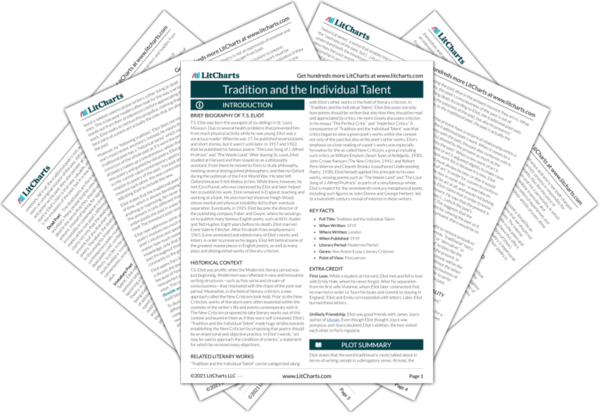Dead Poet Quotes in Tradition and the Individual Talent
We endeavor to find something that can be isolated in order to be enjoyed. Whereas if we approach a poet without this prejudice we shall often find that not only the best, but the most individual parts of his work may be those in which the dead poets, his ancestors, assert their immortality most vigorously.

Unlock explanations and citation info for this and every other Tradition and the Individual Talent quote.
Plus so much more...
Get LitCharts A+To conform merely would be for the new work not really to conform at all; it would not be new, and would therefore not be a work of art. And we do not quite say that the new is more valuable because it fits in; but its fitting in is a test of its value.
But the difference between the present and the past is that the conscious present is an awareness of the past in a way and to an extent which the past’s awareness of itself cannot show.

Dead Poet Quotes in Tradition and the Individual Talent
We endeavor to find something that can be isolated in order to be enjoyed. Whereas if we approach a poet without this prejudice we shall often find that not only the best, but the most individual parts of his work may be those in which the dead poets, his ancestors, assert their immortality most vigorously.

Unlock explanations and citation info for this and every other Tradition and the Individual Talent quote.
Plus so much more...
Get LitCharts A+To conform merely would be for the new work not really to conform at all; it would not be new, and would therefore not be a work of art. And we do not quite say that the new is more valuable because it fits in; but its fitting in is a test of its value.
But the difference between the present and the past is that the conscious present is an awareness of the past in a way and to an extent which the past’s awareness of itself cannot show.











